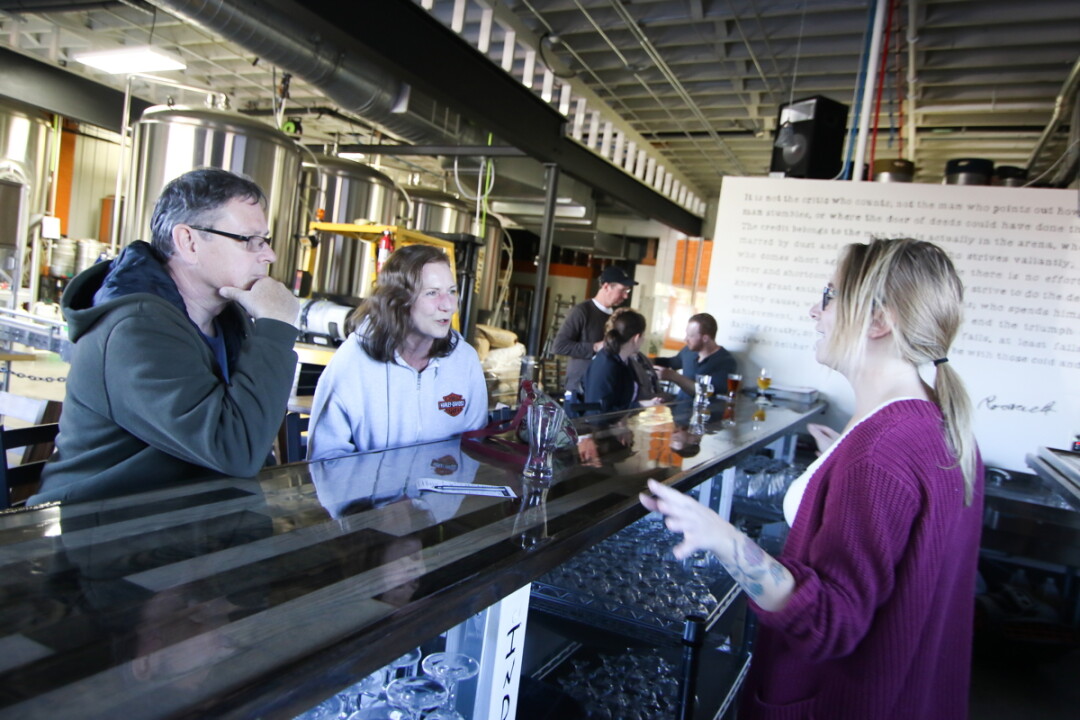New Bill Would Ease Rules for Wisconsin's Small Brewers
Tom Giffey, photos by Andrea Paulseth

Will Glass, founder of The Brewing Projekt in Eau Claire, knows all about the convoluted regulations that govern the production and sale of alcohol in Wisconsin. In fact, he wrestled with them for several years before finally opening his Eau Claire craft brewery and taproom in 2015. And he, along with other small-scale brewers, vinters, and distillers, sounded the alarm earlier this year when they learned that legislation was being discussed in Madison that they feared could undercut their operations or even force them out of business. In fact, that potential legislation prompted Glass and other leaders in Wisconsin’s small-scale alcohol production industry to form the Wisconsin Craft Beverage Coalition in June in an act of preemptive self-defense.
So it came as a great surprise to Glass early this month when a group of state lawmakers announced what is expected to be the first of several bills aimed at streamlining and modernizing Wisconsin’s liquor laws. The bill, unveiled as part of a campaign dubbed “Cheers Wisconsin,” is sponsored by state Reps. Gary Tauchen, R-Bonduel; Shannon Zimmerman, R-River Falls; Dale Kooyenga, R-Brookfield; John Macco, R-Ledgeview; and state Sen. Sheila Harsdorf, R-River Falls. It is currently being circulated for other sponsors, and its supporters say they hope the Legislature considers it later this year.
“This legislation will provide a benefit to brewers, distillers, wholesalers, retailers, and most importantly, consumers,” Harsdorf said at a press conference. “We are seeing in our districts and throughout Wisconsin the archaic three-tier system actually hindering job creation and limiting economic development.”
Glass said craft brewers are excited about the legislation, as much for what it contains as for what it represents. “They did it without any of our input, which is both frustrating and satisfying,” Glass says of the lawmakers who wrote the bill. It’s frustrating because Glass would have pushed for further reforms; it’s satisfying because it indicates some state lawmakers recognize that Wisconsin’s alcohol statues are outdated.
The bill would make a number of changes to existing law:
• Double the production capacity (from 10,000 to 20,000 barrels) of brewpubs and the number of locations they can operate (from six to 12).
• Allow breweries to sell liquor on premises or at off-site retail locations. (In other words, brewpubs and taprooms could operate more like traditional bars, offering cocktails and other beverages in addition to what they brew themselves.)
• Double the capacity for a small winery (from 25,000 to 50,000 gallons).
• Increase by 10 percent the number of Class B liquor licenses a municipality can issue.
• Allow the state Department of Revenue to create a permit for “distillpubs.”
“It’s almost the opposite of what that previous bill that had been circulating was going to do,” Glass said. That other possible legislation, which was leaked in June, would have made it difficult – if not impossible – for brewers and wineries to sell their wares in their own taprooms (instead, they would have had to go through distributors). The proposal would have also created a new state agency to enforce alcohol laws, removing that function from the state Department of Revenue, the Milwaukee Journal Sentinel reported.
By contrast, the newly proposed legislation relaxes the strict three-tier separation between alcohol producers, distributors, and retailers that has existed in Wisconsin since the repeal of Prohibition in the 1930s.
Unsurprisingly, not everyone is excited by this prospect. Specifically, the Wisconsin Tavern League condemned the plans as a threat to “mom and pop” bars because it would make it easier for breweries to sell their own products directly to consumers, giving them a competitive advantage over taverns, who must buy beer and other alcohol from distributors at a markup.
“We’re going to strongly oppose this. It breaks down the three-tier system ... it takes producers and turns them into retailers,” Pete Madland, the Tavern League’s executive director, told The Capital Times. “Our problem is that it gives the producers who compete with our members a distinct advantage because they get their products at the cost of the product while our members have to absorb their cost of production as well as distribution. It obviously puts us at a disadvantage. The three-tier system was set up so they didn’t have to compete with those people.”
Glass dismissed such criticisms. If every brewery in the state opened six retail locations, brewers would still hold less than 1 percent of the state’s liquor licenses, he said.
Glass said that more traditional taverns shouldn’t see taprooms as competition, but rather as different kinds of businesses that attract different customers. “We want to make that pie bigger,” he said, referring to the market for alcohol consumption. “We want to bring people out who don’t necessary want to sit in a traditional bar.”
Whatever its merits, the immediate future for the legislation is uncertain. The Legislature has yet to pass a budget for the 2017-19 biennium – a task that was supposed to be completed by July 1 – and Gov. Scott Walker has also called lawmakers into a special session to consider a bill containing incentives for Taiwanese technology firm Foxconn to create a 20-million-square-foot manufacturing center in Wisconsin. Until these two tasks are completed, don’t expected to see much else happen under the Capitol dome.

